By: debbie lynn elias
It’s always a joy to sit down with Robert Luketic and talk movies. One of the best and the brightest in the business, Luketic took everyone by storm with the surprising success of Legally Blonde which morphed into a franchise spawning sequels upon sequels on the big screen, small screen, stage and straight to DVD. Following that up with an early Josh Duhamel vehicle, Win A Date with Tad Hamilton!, and Jane Fonda’s return to comedic glory in Monster-in-Law, Luketic proved to be more than a force to be reckoned with in the rom-com genre. But as we soon saw, with 21, the fact-based thriller about MIT students and Vegas card counting starring Kevin Spacey and Jim Sturgess, Luketic was much more than laughs and giggles.
With PARANOIA, Luketic delivers a one-two punch that is a taut, tense thriller that has one on the edge of their seat from start to finish. Adapted from Joseph Finder’s 2003 best-seller of the same name, PARANOIA also boasts Luketic’s most star-studded and powerhouse case to date with Harrison Ford, Gary Oldman, Richard Dreyfus and Liam Hemsworth going toe-to-toe in a technology driven battle of surveillance and privacy issues that echos the news headlines of today.
I sat down with Robert Luketic to talk about everything Paranoia, from surveillance technology to casting to Georgio Armani to his love of Philadelphia and of course, the 4000 bottle wine cellar at Arbor Hill Estate.
Robert, PARANOIA is such a wonderful cat and mouse thriller. I was actually back in Philly when you were filming there last summer and you set the whole town on its ears.
Some people were pissed off when we were shutting down streets. But the other movie before me [that shot in Philadelphia] – they reeaaally upset the residents. . .They still hadn’t paid bills. They were an utter disaster those people.
I’m sorry you didn’t get to see the 4000 bottle wine cellar at Arbor Hill.
I know! No one ever told us that. Harrison and I love wine. Every night we’d have some.
I know Harrison loves wine. . . I thought for certain knowing how much he loves wine, that he would have checked out the Arbor Hill wine cellar while you were filming there. That place is an icon in Philadelphia. And the fact that the architect, Rafael Vinoly, is the same one who designed the Kimmel Center that you used for the Wyatt Building.
That’s Gary Oldman’s scenes. Those offices are all up in that thing they built up there. It’s really wild. What a great spot.
One thing that really stands out with your production design and that is Jock Goddard’s (Harrison Ford) private office in his house. You have the one scene with all the ham radios and the dialogue where Liam’s character of Adam asks, “Oh do these work?” And Harrison as Jock gets indignant sputtering, “Of course they work! I built them!” That is so key to this story because all of those ham radios are very old, some of which there are the same models as those in my father’s house who was also a ham radio operator. Important is that some of the ham radios in the film are Heathkit radios which you built yourself. It’s very telling about the character of Jock because it comes “pre-packaged”. You just follow the schematics which is essentially who Jock is. He can build something but he can’t design it.
Exactly. That’s a great detail that you picked up. Wow! You knew that it was Heathkit?
Yes. I knew. When Jock says that he “built them”, that solidified an important story point for me when I saw that little Heathkit on screen.
Bloody good detail there. It’s very good!
Well, bloody good detail of you to be so meticulous with the detail of your production design!
I had two designers. I had David Brisbin and Melissa Stewart. She’s worked with me on every movie I’ve ever done. She’s just really cool. The art department’s budget was perhaps the smallest of all. If you look at everyone else’s department budget, they had the tiniest one. But they rose to the occasion and we were blessed that we found so many great things in Philadelphia, so many things that were ready that we didn’t have to rebuild or augment. Great spaces, great streets. Great cooperation from the City.
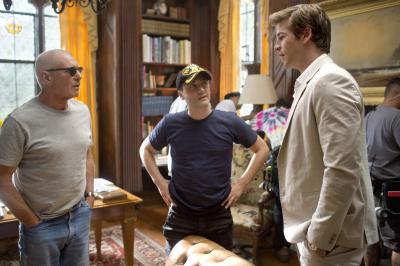
And great tax credits in Philadelphia, too!
Tax credits, great restaurants. We really, really loved the city. It was a really great place to shoot. There’s a lot of great textures there. There’s Downtown, there’s beautiful countryside that’s just within reach of the city, rivers. Very impressive.
That was one of the reasons why I asked Liam about the history of shooting in Philadelphia for this film in particular. That Center City area on Locust Street where you shot many scenes was part of the original City plan; some of the very streets where the very freedoms of the country began.
I thought that was really genius of you. That was a nice anecdote. And you’re right. The very place where those things that we’re now showing how many years later, 240 years, now all those things that were forged there and are no longer really being honored in a way.
That was also one of the great things with the ham radio equipment because what a lot of people don’t know is that the way it operates is through repeater signals just through radio airwaves. You don’t need satellites. Basically by Jock having those, he was out there listening to people for the past six decades and they never knew it. You turn it on and just flip the dial and cue in on any frequency in the world where there’s chatter. You can just listen. You don’t have to talk. That used to be the standard form of communications for the military.
You can just listen to people? Wow. Probably in the NSA in the early years they probably used that, in fact, they probably still do because they monitor every channel, every everything.
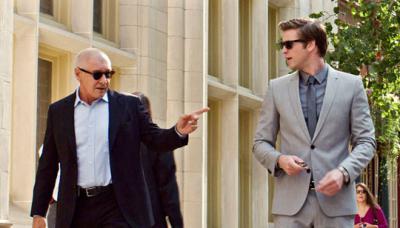
What is it that attracted you to this project? You look at Legally Blonde, which I love beyond belief, and some others, but in comparison, PARANOIA is outside the box.
Legally Blonde was my first movie. I fell into that by accident.
Then you did other rom-coms like Monster-in-Law and Win a Date with Tad Hamilton!, but then switched up with 21.
21 is more me and PARANOIA is more me; more the real me, more the filmmaker that I thought I was going to be. I just caught up in the whirlwind of romantic comedy. It was a big genre, a very successful genre, when I started in the business. Legally Blonde was just in another stratosphere. It became Legally Blonde 2, it’s on ice, it’s on stage, Legally Blonde 4 and 5 straight to DVD [laughing]. It’s interesting. Really what attracted me to PARANOIA was just its timeliness. I was starting to just hear about people with the technology to walk past you, stand next to you in line and download the contents of your phone book and photos and whatever else they want to do. It’s called “skimming”. And this data was of value. The person who skimmed Paris Hilton’s phone found nude photographs and was able to make hundreds of thousands of dollars shopping those around town. Information became a commodity. What we do, the trail we leave becomes a commodity. That was really fascinating to me; the specter of that was that something was off.
I read Finder’s book when it first came out in 2003, but with the script adaptation, you really updated it and brought it into the information age as it now stands. Was that a challenge for you and especially with getting this new age technology and incorporating all of that into the dialogue and the structure of the film?
Yes, it’s different. The book was written 10 years ago. Yes, it was a challenge. There was lots of hair pulling out moments. We needed to consult with people. So we consulted with people who work in Secret Service of foreign countries, and people within our own law enforcement. It was really fascinating to get a handle on that. We wanted everything that we attempt in the movie to be feasible; the hacking, being able to turn on peoples’ phones remotely and accessing their microphones. This is all stuff that we have the capability of now and, in fact, people are doing this right now. That’s why if you really want your phone to be off, take the battery out. Of course, with Apple you can’t take the battery out of an Apple.
It’s very interesting. It was certainly very challenging to bring that all into line. We kept the structure and if you remember in the book, it was more like a Verizon versus an AT&T. It was more about telecommunications and specific technology. Given what we’ve just been through with the legend that was Steve Jobs and Bill Gates, we thought that perhaps they were more relatable figures, if you will, than just anonymous phone companies. We don’t really care about how many packet switches you can process a minute for your data. That would have been not as sexy and exciting as two innovators who are actually making these things and planning to create a huge, if you will, what the NSA has created, a bank of every email, every phone call, everything that is you.
That blew my mind this morning when I saw that on the internet. That was just mind-boggling. And it couldn’t be more timely for the release of the film.
It’s entire e-mails. I was just shocked. Someone told me that it was just the phone number but it’s in fact bigger than that. It’s conversation with keywords that are picked out of entire bodies of the internet. Not that I have anything to hide, but it’s just weird. It’s like someone opening the mail. You post a letter to your mom and your mom receives it and it’s been opened. That’s weird.
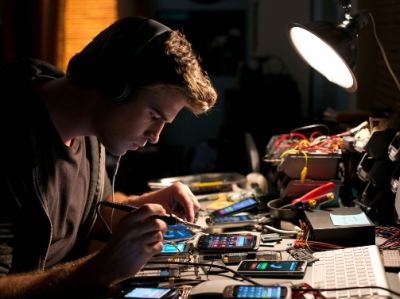
Very interesting aspect of this film is also the dynamic that you have with the paired characters of Nick and Jock and then Adam and Kevin. Adam and Kevin are the younger version of Nick and Jock.
Exactly. One’s the builder. One’s the inventor and thinker.
What is going to keep Adam and Kevin from obsessing on the power that is “the juice” and becoming Nick and Jock?
This generation has had the opportunity to witness the failure, for the first time, I think, in American history, witness the failure of a generation or two above them, and what the greed caused and what the collapse did to the country. Fascinating. Big topic.
And you do a beautiful job of giving Liam’s character of Adam redemption.
Right. He’s not perfect. He betrays his girlfriend in a horrible, horrible way, but that just shows that as human beings, it’s what we do. Sometimes on our journey, and often when we’re younger and when we’re starting out, we don’t see the consequences or we don’t see the people we’re stepping on or the people we’re hurting on the way up. Just be a little more conscious of that.
You have three really great supporting cast members that I can’t think of anyone more perfect for their roles. You’ve got Embeth Davidtz who always has a tone of duplicity to every role she plays. You know something’s coming and it’s probably not good but you never know what it is.
Totally! She’s interesting.
Julian McMahon, who is just the epitome of his demonic best.
I know. Totally scary. He can be scary. Another Australian, fellow Aussie.
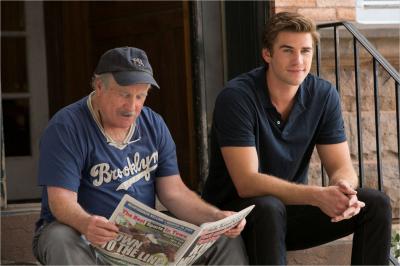
And then you’ve got Richard Dreyfus. He is essentially the grounding essence of the film. While everybody is disconnected from humanity and the human touch in order to get connected through technology, his character of Adam’s father Frank will not embrace that. He’s the man who believes in his core that when there’s trouble, you go to the police, you go to the FBI, paper, pencil, pay phone. It’s his common sense that grounds us.
It’s practical. He’s the voice of reason is a world that sometimes to us appears insane. We all have that one person in our life. It’s usually a parent. It’s usually someone who, like again, someone with foresight whose been able to look at things and assess things. As I get older, I look at things in very different ways. Who I was 10 years ago is radically different to who I am now. Things change.
What led you to Dreyfus? Very believable and very perfect casting.
You’re not gonna believe this but I was watching The Graduate and a man walks in and has two lines. Little tiny walk-on role. I’m like, “Stop! Was that who think it is? Rewind. That’s RICHARD DREYFUS WITH A WALK-ON! 2 lines.” That was fresh in my mind that week. We were talking about who the father could be. We threw out a couple of names and I went, “Let’s add Richard Dreyfus to the list.” For some reason, the name was kind of fresh and up there. And sure enough, he said “yes”. I had a conversation with him on the phone. He came on board and off we went. Great guy. Great, fascinating person to sit in between takes and just talk to about the life he’s had and the ups, the downs, the good, the bad, the wives, the scandal, Hollywood, all that stuff. I’m obsessed with Steven Spielberg – in a good, in a healthy way. To have Harrison Ford and Richard Dreyfus who both worked with Spielberg was fascinating so there was lots of questions about spilling some of the secrets.
Just admit it! You were a kid in a candy store.
Oh yeah! TOTALLY a kid in a candy store! I’m like, “REALLY??? He would do what?” I will always treasure this experience.
You have a great first on this film in that Georgio Armani actually came and helped with production. Armani has never done that before on any film. How did you manage to pull that off? Was it because of Harrison’s long relationship with Armani as his clothier?
Armani did one of the sets. And the clothes. Even though the scene doesn’t involve Harrison at all, I think perhaps that was one of the reasons, but also my producer, Alexandra Milchan was very focused on saving as much of the budget as we could. We very seriously looked for a partner, not just like “give me a chair or a lamp. I want a significant partner who can come in. We have this amazing space to decorate, so let’s show your things and I’ll shoot them in a beautiful way.” Us filmmakers that don’t have unlimited resources, we have to find ways to make each dollar look like $20.
Only $20?
[laughing] Actually, $100.
What did you personally take away from this experience or learn about yourself in the process of making PARANOIA?
How much I love actors! How much I really love talking to them, being with them. Because when they’re all firing and we’re all on the same page, it’s actually a wonderful experience. It’s creative, it’s rich, it’s fun. When you work with someone who’s very rogue or upset with their life or not in a good space, it’s a different experience. I just feel very rejuvenated. Faith restored!
With that restoration of faith, as we all get to have with Adam in the film, what’s the greatest gift that filmmaking gives to you?
Opportunity to see the world. If it wasn’t for filmmaking I don’t think I would have seen a fraction of the most incredible parts of the world, and in a very privileged way. That’s the greatest thing that filmmaking has given me. It’s allowed me to become an adventurer of planet Earth and to experience things. I’ve met such great people. Legends that I never thought I’d meet.
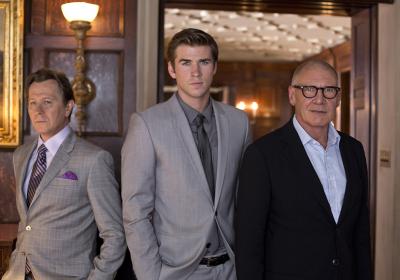
You got three of ‘em rocking in this film. And you did what many thought was impossible. You reteamed Oldman and Ford. The last time we saw them together, Harrison threw Gary out of his airplane. Now Gary got to throw him out of his office.
I know! That was 20 years of pent-up GRRRRR between them. That was really cool. Harrison and I really bonded because we’re both jet pilots. We both like to fly planes. The first time I met Harrison was at his hanger in Santa Monica. This beautiful, 13 aircraft, all in mint condition. Literally, my jaw just hit the ground. I was like, “YOU are gonna be fun, sir! We’re gonna have fun.” I remember saying that. And that’s what we did.
He could have helped cut down on the budget by volunteering to fly everybody [laughing].
Oh, he did! He fly, my producers and a group of us to NYC from Philadelphia to do a little shoot of Jock in his office. So he did contribute. He’s a good guy.
I love that! So, what do you have coming up next?
I’m thinking about two projects – a thriller set in Moscow and then a film about the underbelly of crime in NYC. It’s really a very very interesting piece.
At least you know that the underbelly of crime in NYC, if you need to, go back to Philadelphia, it will double for NYC and you’ll get the great tax incentives!
There you go! I love Philadelphia. I really enjoyed it. I actually miss it.
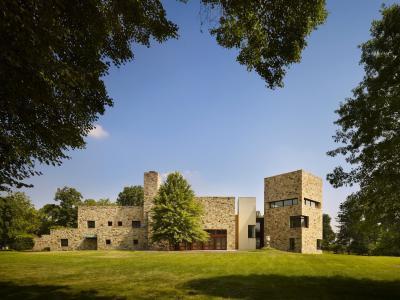
How did you manage to find and get the Arbor Hill Estate, by the way?
Harrison said earlier that he wasn’t there, but he was. The stone fortress. We were looking for what would be a training facility. What could be that? This was the last location. It was the hardest location to find. There are some incredible properties there. Beautiful. We were looking at photos, we were looking at Larry Korman’s house. I’m not sure how it went, whether he suggested it, but we heard that there was this house on the market. It was very fortress-like and very iconic and somewhat imposing. It doesn’t scream warmth when you see it. We went out to it and just as we were coming up the driveway I said, “This is it!” You know straightaway when you see it. That’s how we found it. It was one of the last to come together. It was very very complex. It still had people living inside it and we had to move them out and do whatever it was we were going to do. And there were a lot of expensive things in the house. And you know a film crew – we’re like bulls in a teacup when we arrive!!
It’s so perfect for the film. That stone fortress and the character of Jock.
And then we had to get permission to land a helicopter. That was a whole other thing! [laughing]
#












